2 Week Notice Sample
-
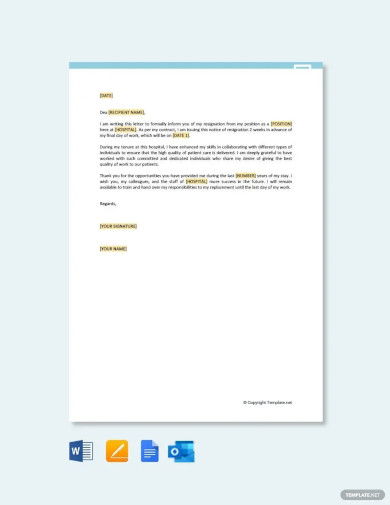
Nursing Resignation Letter 2 Week Notice
download now -

2 Week Lesson Plan Template
download now -
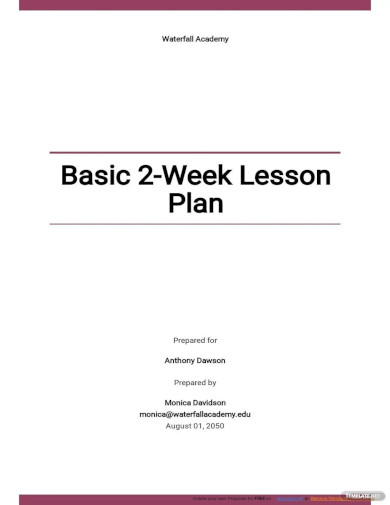
Basic 2 Week Lesson Plan Template
download now -
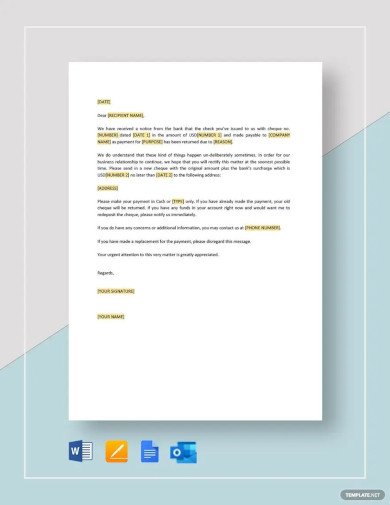
Restaurant Bad Check Notice Template
download now -

Bulk Sale Notice Template
download now -
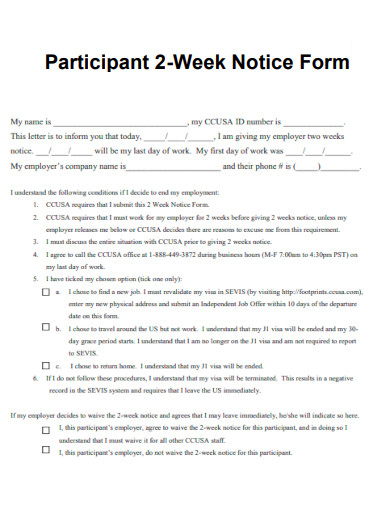
Participant 2 Week Notice Form
download now -
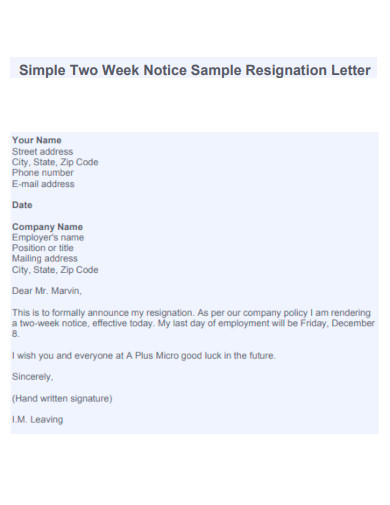
Simple Two Week Notice Resignation Letter
download now -
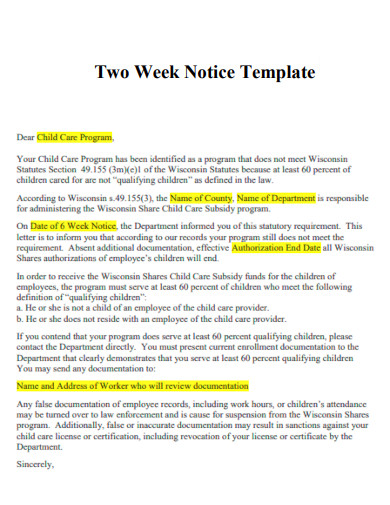
Two Week Notice Template
download now -
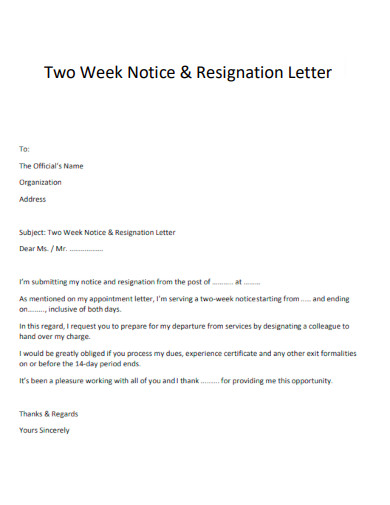
Two Week Notice Example
download now -
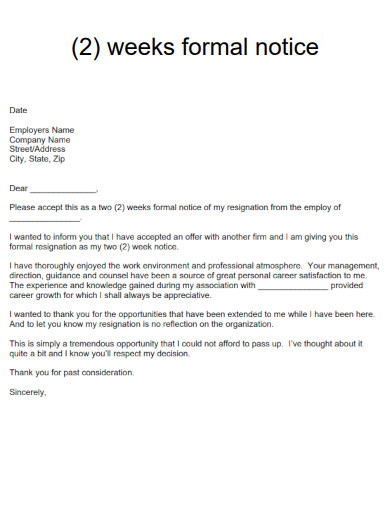
2 weeks Formal Notice
download now -
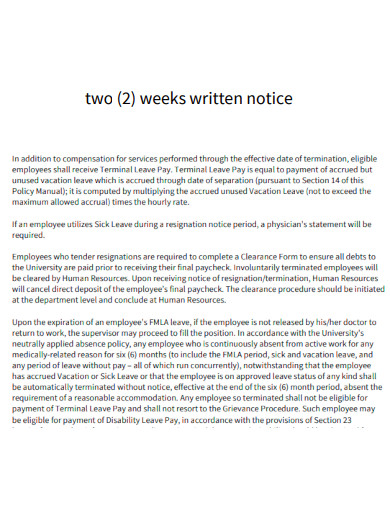
2 Weeks Written Notice
download now
What Is a Two Weeks Notice?
Two weeks’ notice is the formal notification to your current employer that you will leave the company two weeks in advance. Regardless of your profession, giving notice is the standard method of resignation for employees. In the United States, two weeks has become the typical time frame. Although it is a fairly straightforward procedure, only some know how to respectfully and professionally give two weeks’ notice. Unintentionally, some employees may give their two-week notice without considering the repercussions on the organization. This can lead to workplace frustration or conflict. It makes no difference if you’re departing because of an exciting new job contract proposal, needs a break, or decide to start your own business. Understanding how to provide two weeks’ notice can affect your current and future career.
Benefits of Two Weeks Notice
It has become customary to provide notice before leaving a job. Your employer has a right to be informed well before your departure. This will enable sensible and equitable planning for the impending shift on the parts of both you and your employer. However, it is essential to remember that situations can change, and this is only sometimes an option. Not giving enough notice may affect the information that they put in their reference letter, or it may come up during a reference call if you later decide to use your company as a reference. When looking for a new job, paying attention to the value of a favorable reference from a previous employer is crucial. Industries are interconnected because we live in a small world. New employers can easily research your reputation online with a few quick clicks. If you are intrigued, here are some advantages to writing one.
Things You Should Do Before Leaving Your Job
Unfortunately, quitting your job is not as straightforward as giving two weeks’ notice and packing up your desk at some point in your profession. Leaving a position or company is crucial for maintaining your professional connections and financial success. If you are dissatisfied with your job or have a better opportunity elsewhere, you must resign. Here are things to do before abandoning your current job to help you get started:
1. Ensure You Have a Strategy
Before quitting, you must have another position or a solid action plan. If you desire to leave your job, although we recognize that you may be swept up, we strongly advise you to plan your departure before taking action. If you are leaving your current employment because you have a new one lined up, ensure you understand the start date, salary, and benefits. If you are leaving the workforce for reasons other than retirement, consider your situation and create a plan for meeting your daily expenses. If you have yet to be formally hired for a new position but are expecting to be, you should create a detailed budget. Before quitting your job, you should determine how long you can survive without this primary source of income.
2. Update Your Budget
A change in employment status necessitates an adjustment in budgeting. If you’re starting a new job and earning a different amount than usual, creating a budget plan helps alleviate some ambiguity. If you are switching jobs and receiving a pay raise, take some time to determine the best method to use this additional money. You could spend a bit more lavishly, but you could also save more, pay off debt faster, or invest. If you will be job-hunting after quitting, or if your new job comes with a pay cut, consider methods to reduce unnecessary or extra spending. Ensure you can cover your essentials and account for unforeseen costs.
3. Tell Your Superior Before Telling Your Peers
You may be anxious to share new opportunities or changes in your life with others, but you should inform your direct supervisor first. The last item you want is for your supervisor to learn about your departure from a coworker. Your boss should be your workplace’s first individual to know about your departure plans. As a sign of respect and professionalism, schedule a meeting notice to discuss the situation with your supervisor as soon as you decide. This also enables you to include an appropriate notice with your resignation letter. This will assist you in maintaining a positive relationship with your supervisor as you transition into a new position. This is essential if you want a recommendation letter from your supervisor and to maintain a positive relationship with the company.
4. Save and Archive Work Samples
You will lose access to anything work-related when you quit your job immediately and sometimes after your last two weeks. This includes your files, emails, professional growth materials, and more. Any information you want to keep should be downloaded and stored on a personal Dropbox or external hard disk. Save any important business documents that could be used to demonstrate your professional background for job interview assessment and other events, such as significant deliverables or performance reviews. Additionally, ensure that anything you want to keep from your work computer or phone has been saved elsewhere. These items will be taken from you immediately or when your employment obligations are complete, then examined and cleaned of personal information.
5. Clean Your Work Phone and Computer
Before your employer hands over your work-issued electronic devices to someone else, they will conduct a comprehensive inspection. Therefore, if you spend hours playing online games on these devices, that activity will be visible. Before returning your work phone and computer, deleting personal or non-work-related data is a good idea. We won’t ask what you’ve been doing on them. This helps defend your privacy and facilitates the redistribution of these devices. Delete any software you’ve installed on these devices that were not explicitly designed for this task list. Save any files or correspondence outside the device, then delete them. Delete your browsing history, cookies, and any autofill information stored on your computer.
How to Give Two Weeks’ Notice
Now that you understand why giving a two-week notice before departing a company is essential let’s discuss the procedure. Although it may appear to be a straightforward procedure, there are techniques you can employ to make it more efficient. With these tips in mind, you can communicate your resignation in a manner that causes the least disruption for you and your employer.
1. Examine your employee contract and manual
Your employee contract or handbook will likely contain information regarding the resignation process. Before sending that letter or sitting down with your administrator, you should research your organization’s specific guidelines or company policies pertaining to giving notice.
2. Create a Plan
Before making any official announcements about your decision, take the time to organize and plan for the future. Before handing in your notice, carefully weigh the pros and cons. Ensure that you comprehend what initially motivates your decision. Create a five-year plan to assess your current situation and future goals. In addition, before giving notice at your current employment, you should always ensure you’ve signed on the dotted line. It is uncommon, but it is possible for a verbal offer to fall through before the offer letter stage. Finally, it would benefit you if you were prepared for your manager to ask you to resign before two weeks have passed. People leaving the building can be a distraction. And discontent or dissatisfaction can be contagious; many supervisors, even if you’ve had a positive working relationship, will be glad to see you go as soon as you’ve wrapped up any loose ends. You may be asked to depart immediately, so gather your belongings.
3. Communicate the News in Person
You are now prepared to inform your supervisor of your resignation. As is often the case with difficult conversations, face-to-face communication is frequently beneficial. It demonstrates reverence for your employer and creates an environment where communication can flow more freely. It also allows you to acknowledge your superior and express your gratitude for the opportunity they provided.
4. Inform Your Superior Before Others
Once you’ve decided to resign, be prudent and cautious about who you tell about your decision. Your employer does not want this information shared with anyone else. If they do, they may be disappointed or find it impolite that you did not approach them first. You may have friends at work, and you may have even used one or two as references for your new position, but the fewer people who know about your new place before your supervisor, the better.
5. Compose a Formal Two-Weeks’ Notice Letter
Some employment contracts require a written resignation. Even if they don’t, you should always put your remarks in writing with a formal two-week notice letter. Writing down your resignation will ensure everything is clear. Though you may feel compelled to divulge every reason for your departure, it is best to keep things straightforward. Your supervisor can only know details about why you’re leaving, just the primary points pertaining to the company. Additionally, you are not required to provide a reason. It is entirely up to you.
FAQs
Can I quit my job without notice?
If you abandon your job, your employer cannot stop you physically. However, if you quit without giving proper notice, you may violate your employment contract. Your employer may sue you if your early departure results in a financial loss for the company.
Can I resign immediately?
Therefore, the answer is affirmative. According to the law, you should give your employer a month’s notice before your departure, particularly if you are not required to stop working immediately.
What is the best day to resign?
Resigning on the last day of the workweek may help you maintain composure and concentration throughout the process. For instance, if you prefer to disassemble a workspace by yourself, resigning later in the day may be more advantageous. It can also help optimize the supervisor’s personnel transition process.
Correctly drafting a two-week notice letter will be one of your final responsibilities in this role. Consider it as a period after your employment, even if you do not consider it significant. Something is wrong if it’s not present. Review our extensive guide on how to write a resignation letter, complete with numerous free samples, for more information—wishing you the best of success in your next endeavor! Examine our field-tested CV templates and begin updating your resume today!
